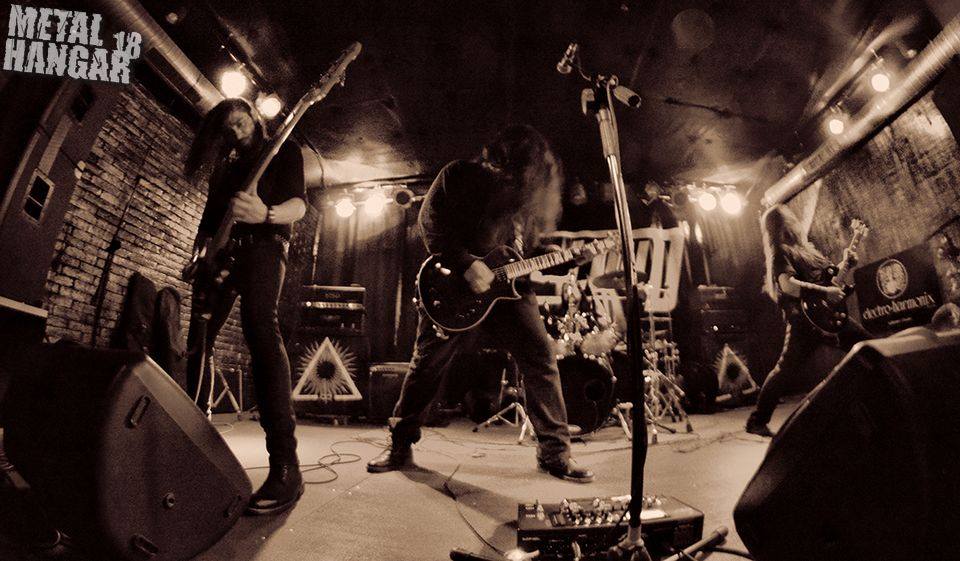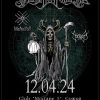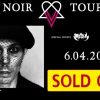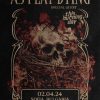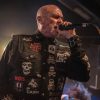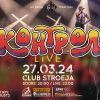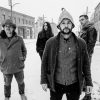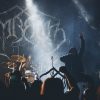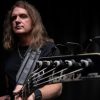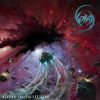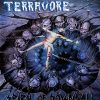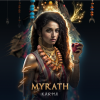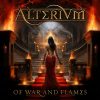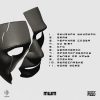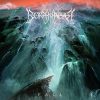Интервю със SOL SISTERE
Interview with SOL SISTERE
First represent the band. How did you create the band?
Sol Sistere: Sol Sistere started in late 2013. Everything began with two songs written by guitarist Ricardo Araya, which had a clear musical proposal of mixing classic melodic black metal with atmospheric sounds. Drummer Pablo Vera noticed the potential and proposed to form a band. Later we found other musicians and recorded the debut EP in 2014. By then, the rest of the concept was developed by the whole band.
Musically, we had the idea of mixing our 90’s melodic black metal influences with a modern approach and atmospheric elements taken from other genres including doom metal, post rock, and some other sounds. We considered this is nothing especially new, but when we hear, for instance, post-black metal bands, they tend to highlight the non-metal elements, and we wanted to keep the balance towards black metal most of the time, trying to use the rest of the influences just as a means to strengthen the melancholic vibe of the music.
S.: What concept did you put in Sol Sistere? Does it have anything in common with the ancient worship of the Sun?
S. S.: Sol Sistere means ‘still sun’ in Latin, and that whole concept is the term for solstice. We take the sun as a metaphor for the human spirit. It can represent a lot of things, especially when you think about these ancient cultures you mentioned, because it is the giver of life, a vital part of our existence.
Also, the natural cycle of the sun can represent rebirth, because it dies at night and it is reborn every morning. The solstice is the point where the sun is higher in the sky, so if you think of it as the human spirit, it can be considered as the highest point we can reach in life. That is what we want to transmit in our music, but focusing on the difficulties and struggles of our nature.
S.: Some of you play in Mourning Sun too, do you carry inspiration from one group to the other?
S. S.: Mourning Sun is a great doom metal band and a nice group of people. We get along pretty well and actually, I think the mutual admiration began before sharing the bass player (Juan Díaz). I don’t think we can share much musically speaking, as our genres are really different, but we definitely share a vision of how a band is supposed to work. For both bands, the do-it-yourself approach is very important, and even though we work with labels and other collaborators, we feel we are the ones in control of our music, our gigs, our merch, and every single aspect of the band. We get our gigs ourselves (by actively organizing or by receiving invitations ourselves directly), and we try not to delegate responsibilities to people outside the band (like touring, concepts for merch or art in general, etc.). I don’t mean those who have different managers are less authentic, not at all, but having this level of control shapes character in a very useful way.
S.: The South American black metal scene is how to say, a bit far from us. Tell us more about that (the bands, its conception behind the music).
S. S.: Well, it varies from country to country. While in Bolivia, for instance, the scene is nonexistent, in Colombia is quite rich. And in the case of Chile, there are many black metal bands, and most of them are mainly influenced by the Norwegian classics. They focus on speed and brutality, so that makes us a little bit rare for our region, because we’re quite melodic and atmospheric. Those characteristics are hard to find.
In South America in general, there are a lot of bands, but travelling from one country to another is a bit hard, not only for the distances (which are a lot bigger than Europe’s), but also for monetary aspects (for both, bands and promoters), so we don’t have the kind of phenomenon you can see in Europe where it’s common to see bands touring inside the continent all the time. Here, all of the different scenes are a lot more hermetic, not because we’re not interested in sharing, but because of the before-said difficulties. This keeps us from taking a whole-region approach to the metal scene and it’s easy to see all countries isolated instead of united.
S.: What inspires the bands there? Can we say that the South American black metal has its own sound and shape (as Norwegian, Swedish, German do for example)
S. S.: It’s not an easy answer. Partially no (to an original, characteristic sound), because of what I just told you, bands take inspiration from the classic second wave of black metal and try to sound as raw as possible. On the other hand yes, because the brutality, speed and darkness they seek have molded a sound which has spread across the region. So if you’re looking for a more ‘traditional’ and raw black metal, you should definitely check out the different South American scenes.
S.: And what inspires you personally? (there are the mighty Andes, Altiplano, your unique ancient cultures…)
S. S.: We do take some inspiration from the majestic nature that surrounds us, and as you mentioned in the question, we have the Andes across the whole country, the altiplano (which is desert) in the north, the rain forests in the south, and a lot of in-between sceneries. Our country is quite rich in terms of nature, so it’s easy to feel inspired by such beauty.
Also, you’re right about the ancient cultures, they also have a very rich world view with a lot of valuable mythology, not only the domestic cultures, but also we take some inspiration from the Inca empire, which is less known than the Mayas (North/Central America), but it’s a similar empire which took place in South America, and their capital was located where we now locate Peru.
Besides all of that, we value some science fiction, in books and movies, and also some occultism. Those kind of topics tend to focus a lot in the human psyche and the struggles of life, and those are definitely topics that influence directly the vision we transmit in our music.
S.: I know that your ancient beliefs also have a dark, occult side. Tell me more about this.
S. S.: Well, in Chile, the most notorious indigenous people are the Mapuche, located in the south. According the their beliefs, witchery exists and there are two types of shamans, the one who produces white magic, or Machi, and the one who produces black magic, or Kalku. According to them, death or diseases are not natural, they are the product of the Kalkus’ manipulation of the elements. That’s very interesting considering they think death is caused by black magic, and as we know, death is unavoidable.
S.: Tell me something about the recordings of your debut album Unfading Incorporated Vacuum. Is it a conceptual album or you just recreated your world’s view, emotions, etc.? What is your message there?
S. S.: It wasn’t intended to be conceptual, but I guess you can say all of the songs tend to go towards the same direction. They are all based on the struggles of human existence and the energies that surround and affect us. Our former singer C. was in charge of the lyrics, and he bore in mind all of these energies and entities that take us to the darkest and most negative side of us. About the album title, the idea of this incorporeal vacuum represents the everflowing cycle of energies within us.
S.: Are you already working on new music?
S. S.: Yes, and we are in a very advance part of the process. We currently have 11 songs, and we are planning our next full length, so we have to pick the best songs to form an album, probably between 7 or 8.
The new songs have the same musical base as the ones in Unfading Incorporeal Vacuum, but drummer Pablo Vera has been more involved in the early stages of the creation process, so some times he has some ideas that I wouldn’t have thought of, like chord progressions, etc. This means that, even though the new music will continue the same path, there are some new tricks that will add something refreshing to the overall perception.
S.: This was your first European tour, I guess. How do you feel after it finished?
S. S.: It was an amazing experience. It was quite a small tour, only 4 dates, but they all were great. We met a lot of great people, shared the stage with awesome bands, and gave it all for the different audiences. We tried our best to deliver a great show in the four countries we visited: Czech Republic, Lithuania, Romania, and Bulgaria.
S.: What are your impressions from Europe?
S. S.: It’s great to see different places. Europe is very different from Chile and the rest of Latin America. It’s always great and impressive to see the architecture and all of the old buildings because, excluding the indigenous past, our world is pretty modern, you can’t see buildings older than the 1700’s tops, while all of European countries have impressive architecture older than that, and also castles. Also the people are very different, not only because of the race, but also because the culture and customs are different. In Bulgaria, for instance, it was quite impressive to see the characters that you use, because we could hardly read anything, and that’s a little bit weird, but also a very good thing, as we wanted to ‘see the world’ if you know what I mean.
S.: What do you plan after the еnd of the tour?
S. S.: Now that we’re back home, we will work very hard in our new album. We’ll try to start the recordings soon. That’s basically our plan, but it implies a lot of work, and as a first step, we have to pick the best songs and work on them to improve them and polish every single detail. We will then proceed to record the drums. Again, we will maintain the do-it-yourself work system as much as we can, so our close friend Carlos Fuentes will once again be in charge of recording the drums as a sound engineer, and I (Ricardo) will record the rest of the instruments in my own studio. The best way to achieve the exact sound and personality we seek for the album is producing it ourselves.
S.: How did you like your first performance in Bulgaria?
S. S.: It was a great show. We weren’t able to see most of Bolg‘s performance because we were really busy getting everything ready for our own show, but we could see that it was a great band, and we had the chance to talk a lot to the singer in the backstage, he even gave us a promo CD of the band (thanks lot dude!). Then, we hit the stage, and everything was awesome. It was a very comfortable stage and the return was ok. The crowd responded in a great way, and the first row was quite enthusiastic. We had a great time.
Later we were able to see Orenda, and believe me, they were the band we wanted to see the most during the whole tour. And as we thought, they were excellent, it’s a very tight band with great songs.
We would love to go back to Bulgaria.
S.: Your message to Bulgarian fans.
S. S.: Thank you very much to all of you who went to the show and supported us. Some of you probably went there to see the other bands, and we hope you liked our performance, we gave it all for you!
Thanks for that interview. Good luck and see you soon!
